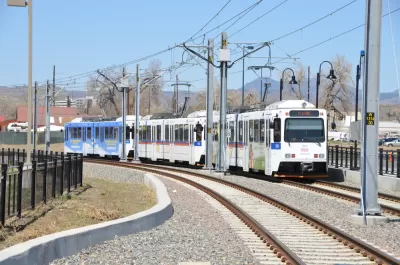An isolated train station north of Denver could become a hub of housing and commercial activity.

After two years of serving local commuters with train service but no other nearby amenities, the lone train station in Commerce City, north of Denver, could become a hub of activity as the city approves new housing and commercial uses in the area to support more transit-oriented development. John Aguilar of the Denver Post reports that the city has approved a 100-unit affordable housing development to kick off development at the site.
“According to RTD [Regional Transportation District], nearly 3,400 transit-oriented development, or TOD, housing units were built in 2021 near stations across multiple rail lines in Denver, Lakewood and Aurora, as well as along the Flatiron Flyer bus rapid transit line on U.S. 36 that takes commuters from Denver to Broomfield and Boulder.” This year, the agency expects that roughly 6,000 multifamily units will be built around transit stations.
A report from the Urban Land Institute Colorado outlines the challenges and opportunities in the area surrounding the Commerce City station. On the plus side, the station is close to downtown Denver, and the nearby South Platte River could provide opportunities to build more amenities and connections. On the other hand, the report found a “lack of connectivity, access, safety, integrated green space, and community amenities,” as well as “fractured property ownership, a history of industrial activity and a lack of water rights in the immediate area.” City officials are looking to other train stations in the region as models for how to approach future development.
FULL STORY: Commerce City wants to turn its only rail stop into a destination

Alabama: Trump Terminates Settlements for Black Communities Harmed By Raw Sewage
Trump deemed the landmark civil rights agreement “illegal DEI and environmental justice policy.”

Planetizen Federal Action Tracker
A weekly monitor of how Trump’s orders and actions are impacting planners and planning in America.

The 120 Year Old Tiny Home Villages That Sheltered San Francisco’s Earthquake Refugees
More than a century ago, San Francisco mobilized to house thousands of residents displaced by the 1906 earthquake. Could their strategy offer a model for the present?

In Both Crashes and Crime, Public Transportation is Far Safer than Driving
Contrary to popular assumptions, public transportation has far lower crash and crime rates than automobile travel. For safer communities, improve and encourage transit travel.

Report: Zoning Reforms Should Complement Nashville’s Ambitious Transit Plan
Without reform, restrictive zoning codes will limit the impact of the city’s planned transit expansion and could exclude some of the residents who depend on transit the most.

Judge Orders Release of Frozen IRA, IIJA Funding
The decision is a victory for environmental groups who charged that freezing funds for critical infrastructure and disaster response programs caused “real and irreparable harm” to communities.
Urban Design for Planners 1: Software Tools
This six-course series explores essential urban design concepts using open source software and equips planners with the tools they need to participate fully in the urban design process.
Planning for Universal Design
Learn the tools for implementing Universal Design in planning regulations.
Clanton & Associates, Inc.
Jessamine County Fiscal Court
Institute for Housing and Urban Development Studies (IHS)
City of Grandview
Harvard GSD Executive Education
Toledo-Lucas County Plan Commissions
Salt Lake City
NYU Wagner Graduate School of Public Service



























